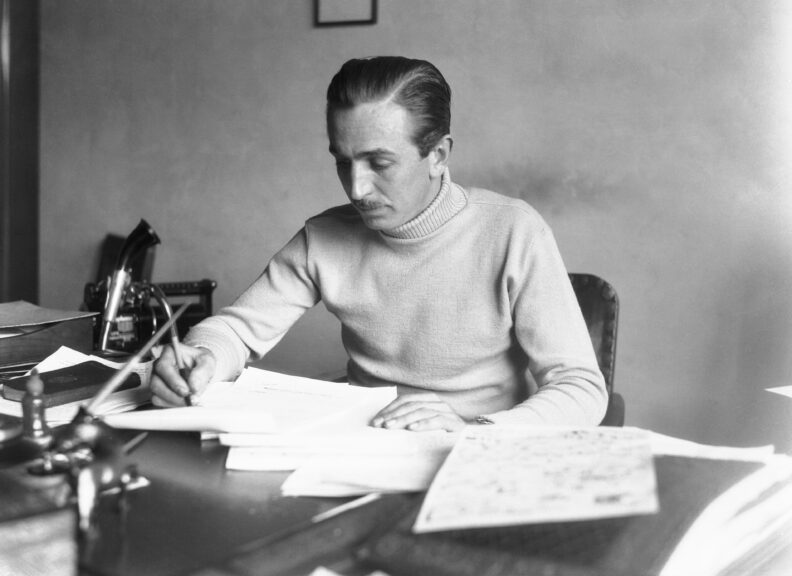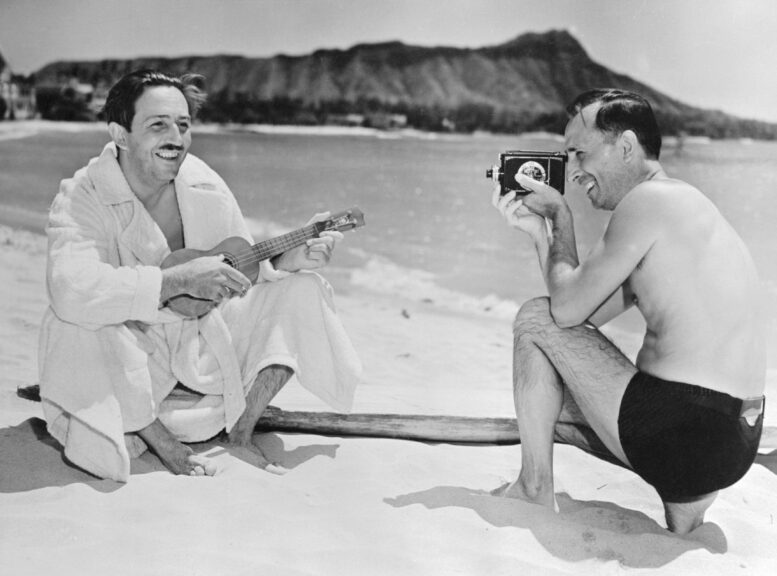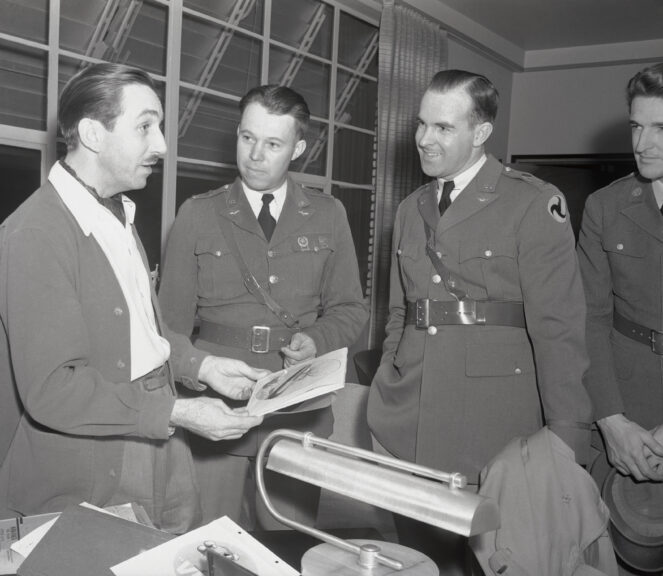There’s little doubt that Walt Disney, and by extension the company he founded, was one of the greatest pop culture icons of the 20th century, and that influence continues right into the present day.
Walt’s determination to appeal to both children and their parents represents a core reason for Disney’s enduring legacy. But, at least at first, it was also clear that the Walt Disney Company’s values were rooted in those of America at large. “Disneyland is dedicated to the ideals, the dreams, and the hard facts that have created America, with the hope that it will be a source of joy and inspiration to all the world,” Walt said of the iconic theme park.
And he wanted Main Street U.S.A., the first “themed land” visitors experience when they enter the park, to represent “everyone’s hometown … the heart line of America.”
But the modern Walt Disney Company seems to be at odds with that notion, with many conservatives arguing that it has strayed far from Walt’s wholesome and patriotic vision. In the last few years, the company has become ever more embroiled in the culture wars. It has filled its recent movie and television content with nods to leftist ideologies, from transgenderism to reparations. One executive producer for Disney boasted during a staff meeting about her “not-at-all-secret gay agenda.”
Additionally, the company has become embroiled in a conflict with the state of Florida over the state’s legislation that prohibits schools from teaching children from kindergarten through 8th grade about gender identity and sexual orientation.
In contrast with the leftward drift the company has experienced, its founder took the opposite route — evolving from a relatively non-political businessman into a strident anti-communist and impassioned advocate for American ideals.
Walt Disney was born in Chicago in 1901, but his family moved to Marceline, Missouri, when he was four. There, Disney became interested in drawing, and the family was active in a local Congregationalist church. The Disney family moved to Kansas City, Missouri, and eventually back to Chicago, where Walt took classes at the Chicago Academy of Fine Arts.

Bettmann/Contributor. Getty Images.
After the U.S. Army rejected him for being too young, Disney joined the Red Cross in September 1918 as an ambulance driver, but he arrived in France after the armistice that ended World War I. After his stint in the Red Cross, he initially returned to Kansas City to pursue cartoons as a career but soon traveled to Los Angeles to meet up with his brother, Roy O. Disney. Together, they founded the Disney Brothers Studio, which would eventually become The Walt Disney Company, and began producing short cartoon films. The company achieved its breakthrough with 1928’s “Steamboat Willie,” considered to be the debut of Mickey Mouse and the first fully synchronized sound cartoon.
The creation and success of Mickey Mouse cartoons propelled Disney to the forefront of animation in Hollywood in the 1930s to the early ’40s, cemented by the release of such classics as “Snow White” and “Pinocchio.”
Despite the massive political upheaval taking place in the U.S. in the early 1930s as a result of the Great Depression and the first round of Democratic President Franklin Delano Roosevelt’s New Deal, Disney was reportedly reluctant to even discuss politics. Joe Grant, who worked on “Snow White,” “Pinocchio,” and “Dumbo,” said that Disney was “very apolitical, believe me,” according to a 2007 biography of Disney by journalist Neal Gabler.
He reportedly voted for Roosevelt in the 1936 presidential election, which Roosevelt won in a landslide based on the mass appeal of the New Deal.

(Original Caption) Walt Disney, celebrated cartoonist and the creator of Mickey Mouse, is shown on the beach at Waikiki playing on a ukulele, while his brother and business manager, Roy, makes him the subject of a movie. Bettmann/Contributor. Getty Images.
Disney switched his support to the Republican Party in the 1940 presidential election, an affiliation that he would maintain for the rest of his life. Wendell Willkie, a businessman from New York who had never previously held political office and had only become a Republican in 1939, clinched the GOP nomination as a dark horse at the national convention. There was very little difference between Roosevelt and Willkie on the major issues of the campaign — both supported the New Deal and material support for the Allies in World War II “short of war.”
“In the election of 1936, I just couldn’t go Republican. … Roy and I split. Roy went Republican and I voted for Roosevelt. By 1940 and everything that happened in the next four years, I was right back on the other bandwagon. I became a [Wendell] Willkie man. He was a great man,” Disney reportedly told a writer.
Disney declined to officially endorse Willkie and even expressed his wish to stay out of politics, telling the Willkie campaign in a letter that “a long time ago I found out that I knew nothing whatsoever about the game of politics and since then I’ve preferred to keep silent about the entire matter rather than see my name attached to any statement that was not my own.”
After the Japanese attack on Pearl Harbor on December 7, 1941 and American’s entry into World War II, Disney’s involvement in politics began to change. Half of Walt Disney Studios in Burbank, California, were occupied by U.S. troops in order to protect a nearby Lockheed aircraft factory from possible air raids (none ever occurred).
Soon, the U.S. government approached Disney with a contract to make propaganda films to help the war effort. The company ultimately made short films for every branch of the military during the war, including the Academy Award-winning 1943 short film “Der Fuehrer’s Face” (in which Donald Duck takes on Hitler) and the more serious “Victory Through Air Power.”

Bettmann/Contributor. Getty Images.
His first explicit endorsement of a presidential candidate was given to Thomas Dewey, the Republican nominee in the 1944 presidential election — once again facing Roosevelt.
He allowed Dewey to hold a rally on studio grounds, donated generously to the Dewey campaign, and even gave a speech in support of Dewey in Los Angeles to a rally of reportedly 93,000 people in September 1944. Other Hollywood stars who came out in support of Dewey at the rally included Lionel Barrymore, Barbara Stanwyck, and Cecil B. DeMille.
Roosevelt again won the White House, for an unprecedented fourth term that would be cut short by his death in April 1945, but it was the closest of his presidential campaigns.
It’s been speculated that the rise of unions in Hollywood, and in the Disney company specifically, provided the catalyst for Walt’s political awakening. After a strike by Disney employees in May 1941 while the company was in dire financial straits, Disney became fiercely anti-communist, believing American communists were behind the labor disputes.
“I definitely feel it was a Communist group trying to take over my artists and they did take them over,” Disney reportedly said about the 1941 strike.
However, Disney never discriminated against employees based on their personal political leanings, according to a biography by historian Michael Barrier.
“He was not an aggressive Red hunter; his conservatism had a strongly personal cast. An employee’s politics were not of any particular concern to him if that employee was not challenging him,” Barrier wrote.
The experience with the Dewey campaign as well as the animators’ strike would cause Disney to become more politically involved in the late 1940s and ’50s, and Walt’s conservative values would become more pronounced as time went on.
The difference between the founder of Disney and its modern iteration could not be more stark. Whereas Walt Disney was personally a Republican but tried to stay out of politics as much as possible in his early life, the modern Walt Disney Company seems to have been overrun by avowed leftist ideologues who are determined to inject politics into all of the company’s products.
(Disclosure: The Daily Wire has announced plans for kids entertainment content.)
via The Daily Wire
Enjoy this article? Read the full version at the authors website: https://www.dailywire.com
